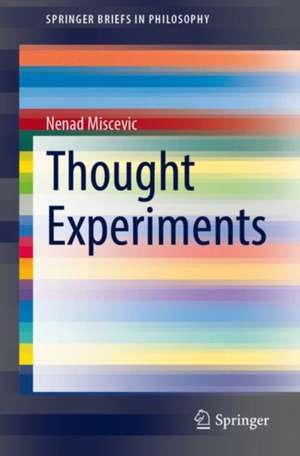Thought Experiments
Autor Nenad Miscevicen Limba Engleză Hardback – 30 sep 2021
It presents the main options in understanding thought experiments, from empiricism to Platonism, and discusses their strengths and weaknesses. However, it also provides some original perspectives on the topic. Firstly, it provides a new definition and analysis of thought experimenting that brings it closer to laboratory experimenting. Secondly, it develops the author’s earlier theory of “mental modelling”, proposed some decades ago by him, and some other researchers in the field as the crucial procedure in thought experimenting. The mental modelling approach links work with thought experimenting to cognitive science and to research on mental simulation which is a hot topic in present-day research. Thirdly, it proposes a principled way to respond to criticism of thought experimentingby “experimental philosophers” as they have been dominating the present-day debates. The response suggests a possible ameliorative, self-help project for thought experimenting.
Finally, the book provides a way to systematize the history of important thought experiments in science and philosophy and thus connects, in an original way, the systematic investigation of experimenting to the historical work of famous thought experiments. It is of interest to scholars interested in history of ideas and philosophy of science.
Preț: 485.99 lei
Nou
Puncte Express: 729
Preț estimativ în valută:
92.99€ • 101.33$ • 78.36£
92.99€ • 101.33$ • 78.36£
Carte tipărită la comandă
Livrare economică 23 aprilie-07 mai
Preluare comenzi: 021 569.72.76
Specificații
ISBN-13: 9783030810818
ISBN-10: 303081081X
Pagini: 130
Ilustrații: X, 130 p. 9 illus., 1 illus. in color.
Dimensiuni: 155 x 235 mm
Greutate: 0.38 kg
Ediția:1st ed. 2022
Editura: Springer International Publishing
Colecția Springer
Locul publicării:Cham, Switzerland
ISBN-10: 303081081X
Pagini: 130
Ilustrații: X, 130 p. 9 illus., 1 illus. in color.
Dimensiuni: 155 x 235 mm
Greutate: 0.38 kg
Ediția:1st ed. 2022
Editura: Springer International Publishing
Colecția Springer
Locul publicării:Cham, Switzerland
Cuprins
Introduction: What are thought experiments?.- The main characteristics: stages of experiments, their role in science in philosophy, their closest relatives.- Uderstanding the thought experiments: empiricist, Platonist and inferentialist proposals, the mental modelling as alternative.- The challenge of experimental philosophy.- Understanding the history of influential though-experiments.- Conclusion.
Notă biografică
Nenad Miscevic is Professor of philosophy at the Philosophical faculty in Maribor, Slovenia, and has been, until this year, Regular Visiting Professor at Central European University Budapest. He also taught as guest professor at Universities of Geneva, Trieste and Klagenfurt. He studied philosophy in Zagreb, Chicago, Paris and Ljubljana, where he defended his doctorate thesis. He has been President of European Society of Analytic Philosophy and has held presidential functions in philosophical societies of his home country.
He has published a number of books in Croatian and three books in English, two in semantics and one in political philosophy and has been contributing to volumes on thought experiments, most recently to the Routledge Handbook of Thought experiments.
He has published a number of books in Croatian and three books in English, two in semantics and one in political philosophy and has been contributing to volumes on thought experiments, most recently to the Routledge Handbook of Thought experiments.
Textul de pe ultima copertă
This book offers a readable introduction to the main aspects of thought experimenting in philosophy and science (together with related imaginative activities in mathematics and linguistics).
It presents the main options in understanding thought experiments, from empiricism to Platonism, and discusses their strengths and weaknesses. However, it also provides some original perspectives on the topic. Firstly, it provides a new definition and analysis of thought experimenting that brings it closer to laboratory experimenting. Secondly, it develops the author’s earlier theory of “mental modelling”, proposed some decades ago by him, and some other researchers in the field as the crucial procedure in thought experimenting. The mental modelling approach links work with thought experimenting to cognitive science and to research on mental simulation which is a hot topic in present-day research. Thirdly, it proposes a principled way to respond to criticism of thought experimentingby “experimental philosophers” as they have been dominating the present-day debates. The response suggests a possible ameliorative, self-help project for thought experimenting.
Finally, the book provides a way to systematize the history of important thought experiments in science and philosophy and thus connects, in an original way, the systematic investigation of experimenting to the historical work of famous thought experiments. It is of interest to scholars interested in history of ideas and philosophy of science.
It presents the main options in understanding thought experiments, from empiricism to Platonism, and discusses their strengths and weaknesses. However, it also provides some original perspectives on the topic. Firstly, it provides a new definition and analysis of thought experimenting that brings it closer to laboratory experimenting. Secondly, it develops the author’s earlier theory of “mental modelling”, proposed some decades ago by him, and some other researchers in the field as the crucial procedure in thought experimenting. The mental modelling approach links work with thought experimenting to cognitive science and to research on mental simulation which is a hot topic in present-day research. Thirdly, it proposes a principled way to respond to criticism of thought experimentingby “experimental philosophers” as they have been dominating the present-day debates. The response suggests a possible ameliorative, self-help project for thought experimenting.
Finally, the book provides a way to systematize the history of important thought experiments in science and philosophy and thus connects, in an original way, the systematic investigation of experimenting to the historical work of famous thought experiments. It is of interest to scholars interested in history of ideas and philosophy of science.
Caracteristici
Provides a new definition and analysis of thought experimenting that brings it closer to laboratory experimenting Shows a principled way to respond to criticism of thought experimenting and a self-help project for practicing Proposes a way to systematize the history of important thought experiments in science and philosophy
